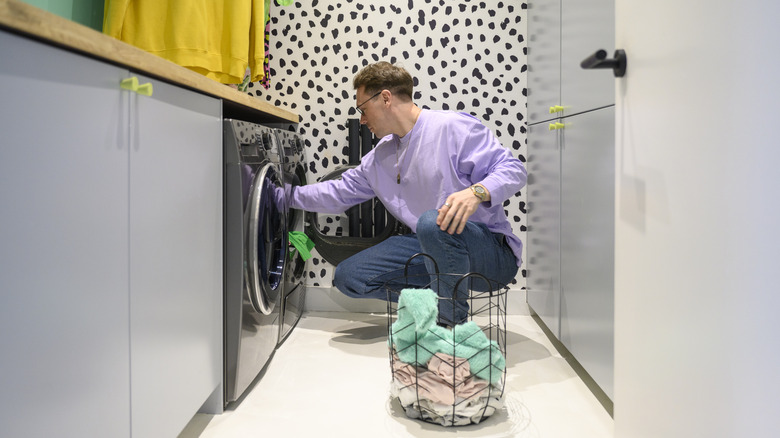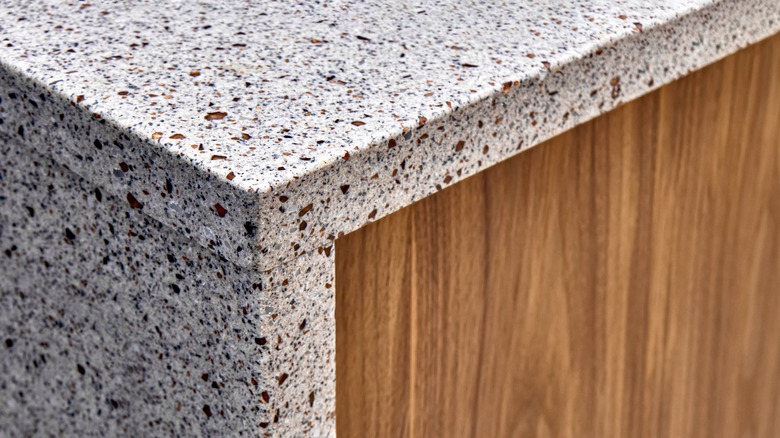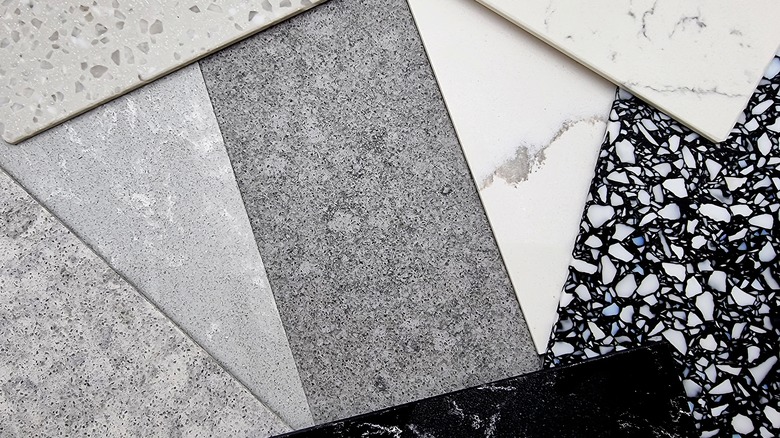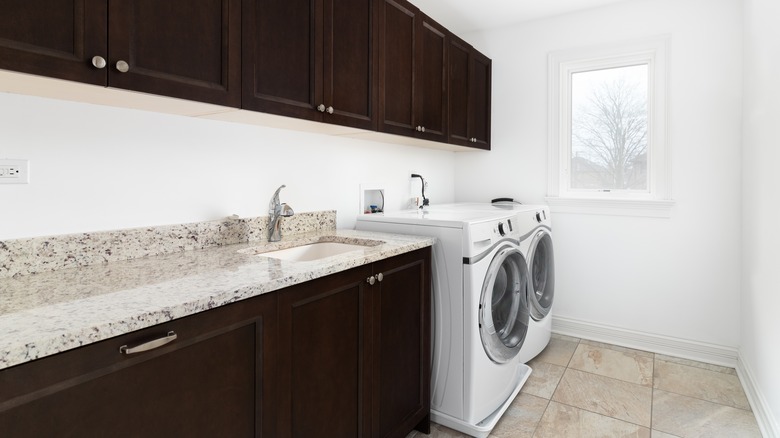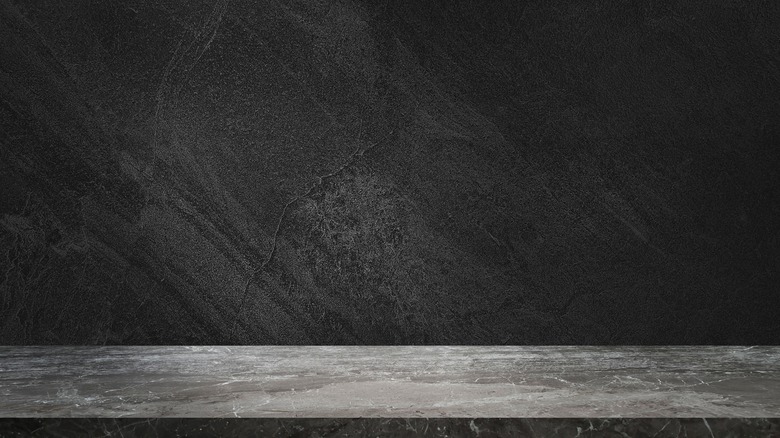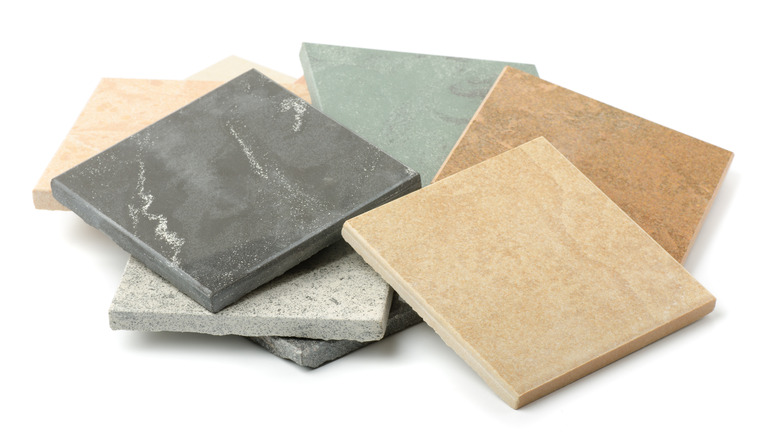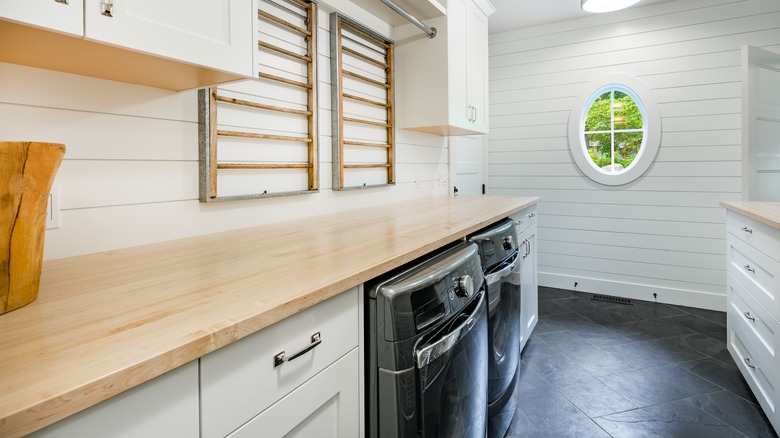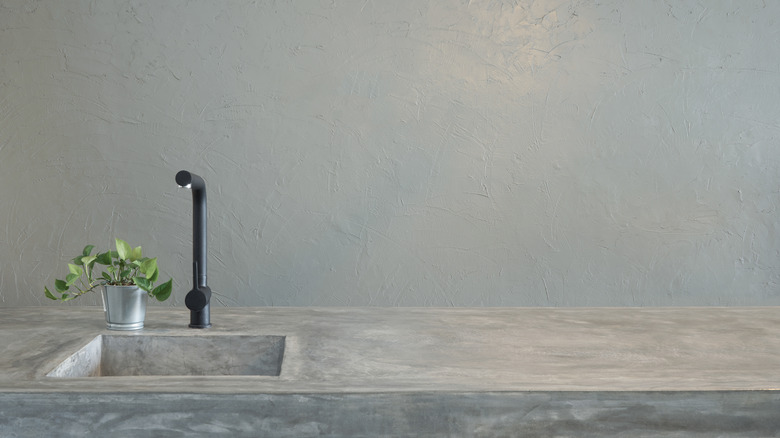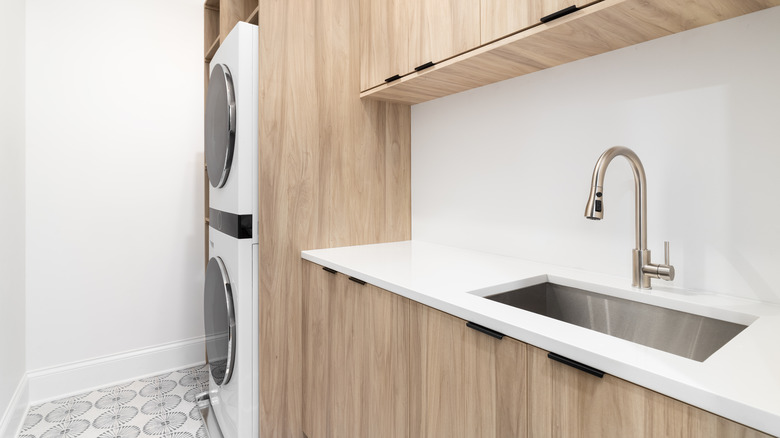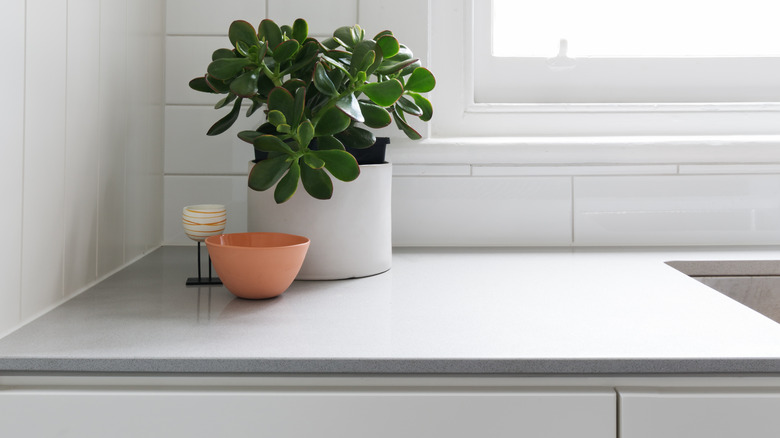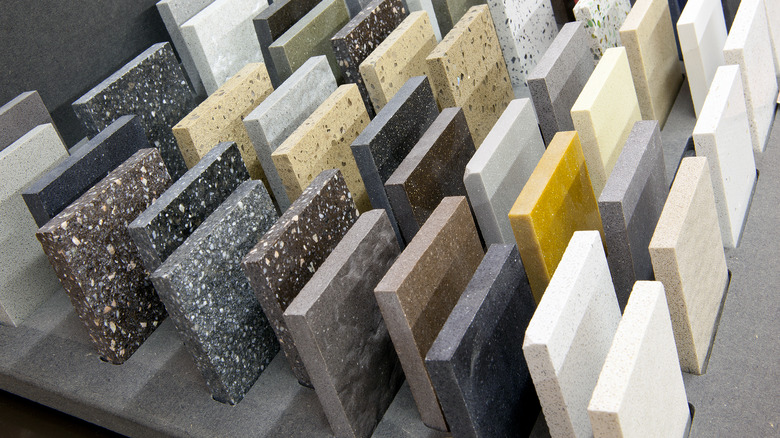The 9 Best Countertop Materials To Put In Your Laundry Room
Because they are considered by many as utility areas, laundry rooms often get left out in terms of aesthetics and furnishings. However, we should not underestimate their role in maintaining a healthy, pleasant home abounding in joy, comfort, and clean underwear. It might surprise you, but laundry rooms have continuously been the most desired home feature of buyers (from a selection of more than 200 items), according to a study by the National Association of Home Builders. There is no doubt, therefore, that this space deserves proper provisions to make it stylish and functional, and this includes a well-appointed countertop.
Laundry room work surfaces need a material that is both sturdy and smooth to aid in folding clothes. They need to endure occasional spills of chemicals such as detergent and bleach. The ability to resist the heat of ironing clothes is a big plus too. Price is also a major factor. Considering that this part of the house is not as visible or frequented by people, many homeowners may be hesitant to spend too much on a countertop. Nonetheless, there are numerous options available that can enhance the look and efficiency of your laundry room at varying price points. Assessing each one based on functional benefits, cost-effectiveness, visual appeal, and ease of maintenance, we bring you our list of the best countertop materials for your laundry room.
1. Solid surface is low maintenance and moderately priced
If we are to meet halfway between appearance, cost, and functional value, solid surfaces would be a likely candidate. Solid surfaces are manufactured using a mixture of minerals and acrylic polymers. They are a favored alternative to natural stone materials such as granite and marble. Their non-porous character makes them resilient to moisture without the need for sealing. So handling damp clothes or rinse water is no problem at all. Since they are man-made, they can be modified into various designs too, giving you an abundance of options to choose from that will blend perfectly with your laundry room.
One important thing to know before you invest in a solid surface countertop is that they are priced higher than other synthetic types such as laminate. However, they are still more affordable than stone-based options. You cannot iron clothes directly on a solid surface, so make sure to use a mat or a blanket on top of it. Solid surfaces can also sustain scratches from time to time, but these can be fixed by careful sanding.
2. Quartz countertops are a lifelong luxury
Quartz offers almost everything a laundry room counter needs. It is non-porous, making it resistant to moisture and bacteria — so nothing to fear when leaving your stained napkins on it. It requires no sealing or oiling, freeing you from any major maintenance work. It is flat and seamless, so perfect for folding clothes. Its gorgeous appearance, which goes well with any theme, is also a big selling point. Most notably, quartz is arguably the strongest of all countertop materials. "If you want to keep it forever, you can keep it forever. That's ridiculously appealing," says designer Jessica Johnson in an interview with Dwell. It also is one of the best countertop options in terms of resale value.
Quartz contains small amounts of resin that will scorch under extreme heat. Therefore, you cannot iron clothes on it directly. Nonetheless, its supreme durability more than makes up for that. The only factor that keeps it from taking the top spot on our list is its high cost. Quartz is one of the priciest options out there, going up to $200 per square foot installed according to Homeguide. If you have the budget to splurge, though, this material is surely a winning choice for your laundry room.
3. Granite countertops are worth the price
Granite, considered a rival of quartz, is another high-end choice for your laundry room countertop. Granite is made of 100% natural stone, possessing a distinct organic beauty that appeals to many homeowners. It is harder than most other materials and will not easily scratch or chip. A granite countertop will withstand very high temperatures and can serve perfectly as a built-in ironing board. Its classic look has remained in style for decades and will likely stay attractive to buyers if ever you decide to sell your property later on.
Take note, however, that this material is porous and will absorb moisture. Therefore, you need to have your granite countertop sealed. Most experts recommend doing this once a year. Be mindful that exposure to high heat can weaken some sealants. So if you iron clothes on your counter quite often, it may need more frequent sealing. Apart from that, the only maintenance it needs is regular cleaning with soap and water.
4. Soapstone is functional and has a unique charm
Because it is an uncommon choice, soapstone is admired by many for its unfamiliar beauty. This naturally occurring material has a dramatic shade ranging from light gray to charcoal black. Not known to many too, is that its combined properties specifically make it ideal for a laundry room. For instance, it is non-porous and does not need sealing. It has high heat resistance, so you can iron on it. And its tough composition is impenetrable to household chemicals. Shaun Crha, principal designer and founder of Wrensted Interiors, used soapstone in one of his laundry room projects, praising its durability. He also noted that while the surface will mostly be used for folding clothes, it can withstand soap or bleach drips at times.
One of the things you need to know about soapstone countertops is that the material is known to get scratched more easily than other stone countertops. Keep in mind this would be a bigger issue if used as a kitchen counter where it will have to endure more activities, and wear and tear. For a laundry room, however, where the work is less of a strain, this downside could be a worthy compromise. Scratch marks can also be removed through sanding.
5. Tile countertops are a practical choice
Porcelain and ceramic tiles are the least costly options on our list. But being modest is a forgivable decision for a humble laundry room. Especially because tiles hold a good deal of benefits that might surprise you. Tiles are hard, non-porous surfaces. They do not scratch or stain easily, and can stand very high temperatures. If you have the skills, installation can even be done DIY which will further reduce costs.
Unlike other materials that come as whole slabs, tiles are partitioned. For some homeowners, the seams could be an inconvenience when folding or ironing their clothing as they will not give you a completely flat surface. However, this will not be an issue if you use large-size tiles that cover wider areas with minimal grout lines. Tiles are also underestimated in terms of aesthetics compared to the more extravagant stone alternatives. However, some experts cite that tile countertops are gaining new popularity in recent years. More and more designs are being produced with higher quality than before. "There are really no limitations," says designer Christina Temple about using tiles in her designs in an interview with Neal's Design Remodel. "That's what makes it so unique and creative for each project."
6. Butcher blocks are affordable and add a homey feel
Butcher blocks are whole pieces of lumber cut and finished to fit as countertops. They are a pretty popular choice due to their affordability. Because the material is relatively easy to source and install, they are less costly than other types that are mined or fabricated. Moreover, their nostalgic charm never fails to bring warmth and character to any space and never goes out of style. Wood is also flexible. It can be shaped into various forms and refinished when needed to bring back its smoothness and even tone.
One thing to note is that the butcher blocks also have to be regularly sealed to keep moisture from slipping into the grains. Professionals recommend applying fresh sealant about every six months. Not only will it protect the countertop, but it will also enhance the surface, making it more comfortable for folding your fresh laundry. You cannot iron directly on butcher blocks as they are susceptible to burns. But you can easily solve this by placing a mat on top or using a garment steamer instead.
7. Concrete countertops are very versatile
Concrete is possibly the most misunderstood of all countertop materials. This is because it is primarily a structural element rather than a finished surface. However, if you would explore the possibilities, concrete is very customizable in terms of shape, color, and overall design. Such countertops can go far beyond the typical gray industrial look and can even imitate marble or wood. You can embed decorative pieces on them, stain or dye them different colors, or even create unique artworks using epoxy. These countertops are considerably durable and can withstand high heat without sustaining burn marks. Its versatility also allows it to custom fit into awkward spaces in the laundry room.
Concrete is porous by nature, but as long as it is properly sealed and regularly cleaned, it will stay moisture-resistant and free from mold and bacteria. Resealing every other year is recommended. Because of the labor involved, this countertop material costs more than other synthetic types. However, it is considered a premium product and has significant resale value. The ease of maintenance will also save you a lot of hassle.
8. Marble's opulent beauty is unmatched and timeless
No one can deny the classic beauty of marble. Its allure has enchanted people for millennia, as far back as ancient Egypt, and its popularity has never faded up to this day. Like granite, marble is a purely natural stone material. It sports a characteristic milky hue that many homeowners covet, although it comes in various other shades as well. Its functional features also deserve respect. It is smooth and cool to the touch, so handling your linens can be a relaxing experience. A white surface can also help visually when sorting your clothing.
Like all things pretty, marble countertops need proper care and protection. These stone surfaces as porous and will absorb liquid substances. Sealing is vital to keep them stain-free. Doing this every six months will help them stay pristine for an extended period. Well-maintained marble counters still being used today have been around for decades.
9. Laminate is a welcome budget option
Laminate is admittedly one of the least-valued materials for countertops. But if you are working on a budget, it can be a lifesaver. Laminate surfaces have their own array of useful features that are often overlooked. Many sites warn that water exposure will destroy your laminate and that it can easily get scratched. Now, it is true that this manmade material does not possess the same level of durability as its more expensive counterparts. However, they are certainly not defenseless. Laminate counters have a moderate level of protection and are resistant to moisture — enough to make them last up to 20 years given proper care. Their smooth finish also provides an excellent surface for folding clothes.
Another praiseworthy advantage of laminate is its diverse design selection. Whatever your motif for your laundry room, there is surely a laminate type to match it. They come in various colors and graphic patterns. They can even mimic other materials such as stone and wood. Laminate countertops also do not need annual sealing, making them a low-maintenance choice.
10. The selection process
The items above were selected and ranked following a multi-layered screening process. First, they were assessed based on the material's functional significance, which refers to how well its properties match the specific needs of a laundry room. After this, the list underwent succeeding assessments according to supplementary aspects including purchase and installation costs, maintenance requirements, expected lifespan, and aesthetic value. We considered numerous testimonies and personal recommendations from subject matter experts including interior designers, builders, realtors, stone fabricators, and carpentry business owners. Professional home service websites were consulted for updated price estimates.

